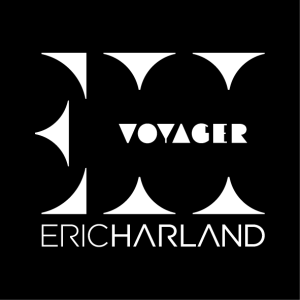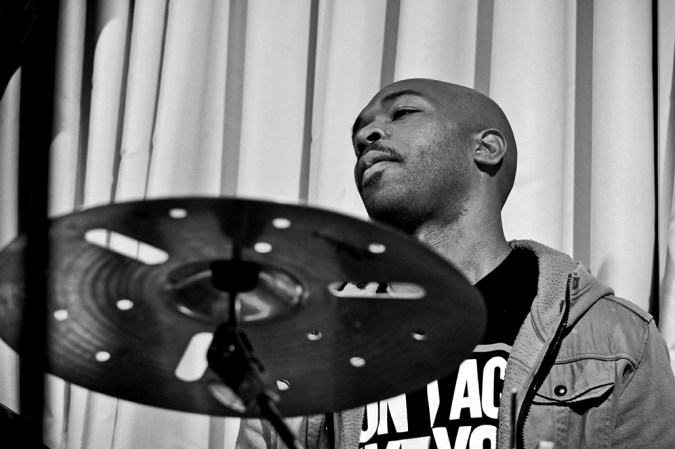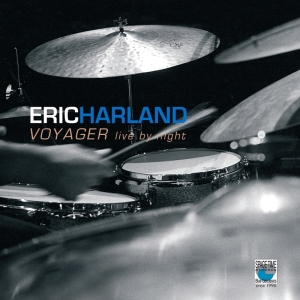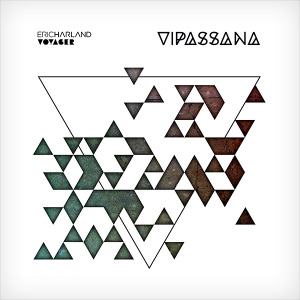If you’re not already familiar with the impressive musical history of Eric Harland you only have to read on to get a sense of why he is considered to be one of the world’s greatest contemporary drummers in the jazz sphere.
Eric Harland returns to Australia next week with Voyager to play four shows at Melbourne International Jazz Festival 2015. And after a late Wednesday night gig at New York’s Blue Note, he was gracious enough to start his Thursday morning with an inspiring rave with me about his love of Melbourne’s iconic jazz venue Bennetts Lane, the openness he finds in Australian audiences versus those in the States, a jazz centre run by people working solely for their love of music and the other-worldy realms music can take us to – and took he and Wayne Shorter to when they played ‘Footprints’ together in 2008.
x
In Conversation With Eric Harland…
Beaver: How’s your day looking on that side of the world?
Eric Harland: It’s great. I’m playing this week at the Blue Note in New York and we do these late nights cause we’re playing two sets. So you know, late hours and early mornings.
Beaver: A morning interview to start your day is probably not so ideal then.
Eric Harland: No, it’s good. I’m sure I would have been up anyway cause I just got back from Europe. Once you come back to the States from Europe you just tend to wake up early anyway from that time change.
Beaver: And into another timezone next week for your Australian shows?
Eric Harland: Yeah, that’s gonna be fun. I love Australia. The people there are always great. Optimistic is the word that comes to mind about them. I love their openness.
It’s very different to here in the States where people tend to be more judgmental about a lot of of different things. So I love playing there. It’s very similar to playing in Europe where people are really into the music and are ready to hear what’s about to transpire without coming into the situation with a preconceived notion or expectation of something that’s gonna happen. It takes a big pressure off playing.
Beaver: Could it be that people in Australia are thirstier for live music compared to the States where there’s more of a saturation of music and artists playing it?
Eric Harland: You know what, I think you hit the nail right on the head. There’s just so much music here and so many artists that are doing the craft.
“in other countries music is…the act of expression”
I also think it’s a difference in what we see the craft as. In other countries like Australia the lifestyle and living is taken care of on a base level. But in the States it’s not the same. Just living here won’t get you any money; and won’t get you health care and schooling. I think people here really utilize whatever they have to try and better their life financially, just because they want to ensure they have somewhere to live and a job and stuff.
I feel like in other countries music is more ‘the act of expression’: using artists’ ears; speaking with one another – ‘What are you saying today?’ ‘What is the sound coming from your soul?’ It’s great.
Beaver: So playing music and having to be the best at it in the States is like a survival mechanism?
Eric Harland: Yeah it’s totally that. You see it all the time. A lot of musicians don’t go within to see what actually resonates with them personally. A lot of them tend to come from a standpoint of “What’s popular? I better recreate that so I can guarantee people will like it”.
I think that if you come authentically from within, people will resonate with it anyway. And that’s why we’re so attracted to the really great musicians who have stood the test of time. It’s because they really come from a unique sound that was within the person – like a statement – a music statement – a life statement – a soul statement, that they really wanted to express.
And we love being a part of that journey. I’m happy for all the opportunities I have today to be able to express myself musically and just see what happens.
….
“one of my favorite places in the world”
Beaver: I see that three out of your four festival shows next week are sold out.
Eric Harland: Wow, that’s so great. I love Bennetts Lane. I remember hearing Chris Dave there last year. And also playing there with Jamie Oehlers, Paul Grabowsky and Reuben Rogers. It’s a great listening room and a great atmosphere. I love the way the people really wrap around the stage. It’s not quite a half circle but just that nice round-about. You feel the energy is really coming at you from all angles, especially where the drums are. And the acoustic of sounds really travels from the stage. There’s a certain magic in that room, acoustically and feeling-wise. And I’m sure the feeling just comes from the openness of the people. But I really really do enjoy playing there, it’s amazing.
Beaver: Yeah Bennetts Lane is a special place. Did you know that on the weekend after the festival ends, it’s closing its doors after 22 years? It’s a huge cultural loss.
Eric Harland: Oh yeah, when I heard that I was like “Oh my god. Nooooo”. In a way I feel honored to be able to play there. It’s one of my favorite places in the world.
Beaver: Do you think that Bennetts Lane struggle to stay open and closure is reflective of what’s going on elsewhere in the world?
Eric Harland: Well you know that’s one I will say about the States. Clubs close and then they reopen under different management. Hopefully the same will happen at Bennetts Lane.
…
In New York we definitely have an over-saturation problem.
Beaver: Of venues?
Erica Harland: Yeah. There’s a lot of different venues. And a lot of them I personally try and avoid.
“no genuine appreciation for the artist”
I don’t feel like the way that they treat musicians is necessarily on a quality level. It seems like a lot of clubs, yeah mainly clubs, treat you like you’re ‘work for hire’. It’s almost like you could be a wedding band. They just want you to fill the room so that they can make money off you. There’s no genuine appreciation for the artist they’re hiring to be in the room.
Now I’m at a point in my life where I have a closer relationships with lots of promoters and venues so it’s different for me now. But I can still clearly see that the venue staff are just there making a check. It’s a great day when you can really wow the staff. But, you know, do you really have to wow them?
I remember hearing stories back in the day where people wanted to work just for the love of music.
“people wanted to work just for the love of music”
Prime example: there’s a club called Kuumbwa Jazz Centre in Santa Cruz, California. Basically the whole club is set up with volunteers who just want to be around music and musicians – just because of the way music makes them feel. So you can instantly feel that love when you walk in the room. You don’t have to prove anything to anybody. Just the fact that you’re an artist means you’re completely embraced and everyone is like “We’re here for you. Let us know what you need”. Its a family and communal atmosphere that’s contagious. It jumps on you and it just feeds your soul and you’re so happy you’re there.
So there’s Kuumbwa versus playing clubs in New York (and I’m not gonna name names), where the city is expensive and people are a little jaded. They ready to go home, and the night just started. You might need a little something, maybe to place an order for food so you can get some nourishment before the gig and the hostess isn’t interested in serving you. So you’re like “Is this really where we’re playing tonight?” And it really affects the music. It affects the way you feel.
…
Beaver: Yeah the under-appreciation and payment of musicians is a complete and utter travesty. To make music is one of the most valuable contributions you can make to the world. Kuumbwa sounds amazing. Who owns it?
Eric Harland: It’s a guy called Tim Jackson. He’s also the guy who runs the Monterey Jazz Festival. Kuumbwa is like his baby. He’s been doin’ it since the 70s.
I was fortunate enough to celebrate with them on their 40th anniversary this year. We did a whole ‘Trane band – a one-night special occasion show. It was me and Benny Green, Christian McBride, Joshua Redman and Roy Hargrove. The energy in the room was just off the charts.
“a sense of love for the artists…and music”
When Tim emailed us all and asked if we wanted to be a part of the 40th anniversary, and said he really wanted this particular band to come together and play, you could see the immediate response we all had. Everyone answered his original email within two hours, which says a lot about that place and about Tim as a person: his vision to always maintain a sense of love for the artists and for the music. And how that’s transmitted is beautiful.
Beaver: He sounds like a kindred spirit. It’s really inspiring to hear that a place like that exists in the world.
…
You have so many great stories from your lifetime of music. Amongst all of those experiences do you want to share a magical, goodness-of-music moment that affected you profoundly?
Eric Harland: Wow. There’s too many. I don’t even know where to begin. I’ll start with telling you the first thing that popped into my head.
“Damn – so this realm is available?”
The first time I was in the SF Jazz Collective, we did a show one year honouring Wayne Shorter. That was the first time I got the chance to actually play with him. We were kind of doing a mini-rehearsal/sound check and we started playing some of Wayne’s music. Wayne was at the side, putting his horn together, really chilled and relaxed. We started playing ‘Footprints’. Then Wayne started playing and I felt an immediate connection. It was like “Oh-My-God”. I just felt like we were talking – without using words.
It’s funny cause sometimes you play music and it does get real conceptual at times. You’re throwing out ideas and other guys are listening and they’re responding to that idea. That’s the communication using rhythm and harmonies, and sometimes songs, sometimes phrases. But the experience of playing with Wayne shorter is the same as it is playing with Charles Lloyd: it’s an invitation beyond music.
When Wayne started in on ‘Footprints’ it was just such an ethereal experience. I connected with him so strong and so fast – and it resonated in how he just walked straight over to me and stood right next to me on stage. And we just was playing, and it was just one of the most amazing experiences.
I was taken back because it really felt like we were no longer playing – that we was just like two kids in a bubble just kind of floating up in the air like in space. I felt like I wasn’t even playing. It was just something happening. Physically, my body was making the motions and I could hear the sound, but it didn’t sound the same. It didn’t feel the same. The song was no longer relevant. We were still playing the song but it was just like this moment where I was like “Damn – so this realm is available? Woah. Okay then”. It was another level that I had never really experienced before. That changed my life from that point on.
“screaming…crying…jumping up and down…and weeping”
I remember hearing another great story from a friend about ‘Trane playing at the Village Vanguard. He said it was the most spellbinding thing he had ever seen in his life. He opened the door and just heard people screaming and crying and jumping up and down and weepin’ like the whole room had turned into a church. He made his way through the room and looked up and saw that ‘Trane was in the middle of the stage, on the floor, on his knees with his horn playing into Elvin’s bass drum – and the two of them had worked up such a chant that it shook the whole room. When it was over everyone came together and was crying. When I heard that story I was just like “God Damn”. I know that exact kind of thing happens in church but I was like, “In a jazz club? Really? Man, we got our work cut out for us”.
The mission statement that we have available for us to do, and what we have to contribute to the people, is incredible.
Beaver: I completely agree. And I love hearing good music news stories – thanks so much for sharing yours.
So then, you’re on mission next week at the jazz festival?
Eric Harland: Yeah the Melbourne shows are gonna be great. I don’t have any expectations. I love the guys in the band – Taylor Eigsti [piano], Julian Lage [guitar], Harish Raghavan [double bass] and Walter Smith III [sax]. We’re gonna come and just be available. We’re already excited that everyone’s so ready for us to be there.
We’re gonna play both older and new material – dancing back and forth between – and feeling the flow of the moment – seeing what happens – and remaining available.
I’m ecstatic. And ready.
Beaver: Well now I am too 🙂 . Chatting with you today has been such a pleasure – and super inspiring. Thanks so much. Have a great day and a blessed time on the Bennetts Lane stage in it’s final days.
Eric Harland: Thanks to you. You take care.
[Click here to read the full interview with Eric Harland.]
~~~~~
Tickets are still available to Eric Harland’s fourth Melbourne International Jazz Festival show at Bennetts Lane next Sunday night. Get them here before they sell out.
 You can also hear Eric Harland playing at Bennetts Lane on Friday night with the Walter Smith III Quintet.
You can also hear Eric Harland playing at Bennetts Lane on Friday night with the Walter Smith III Quintet.






